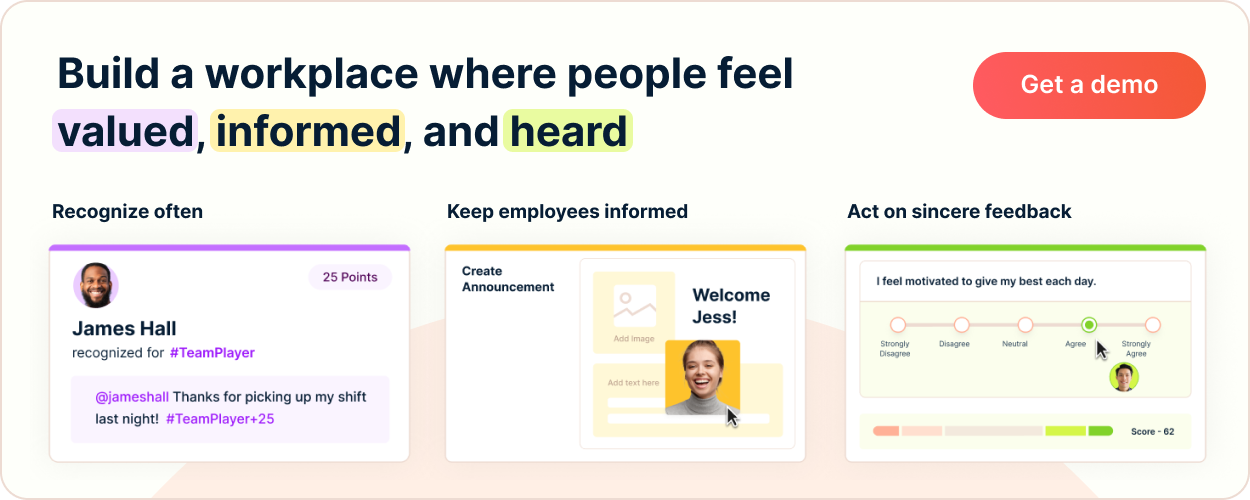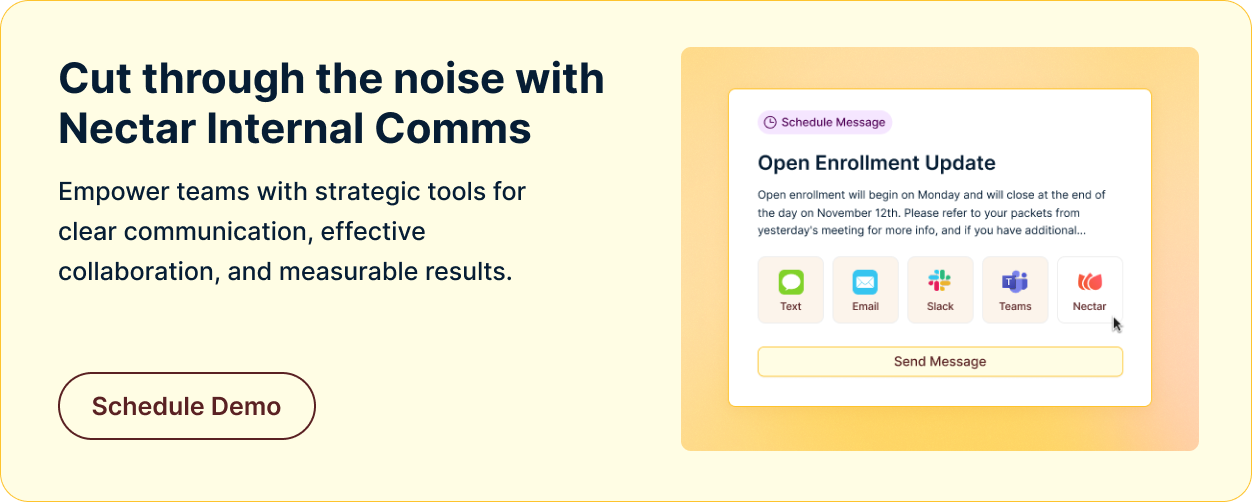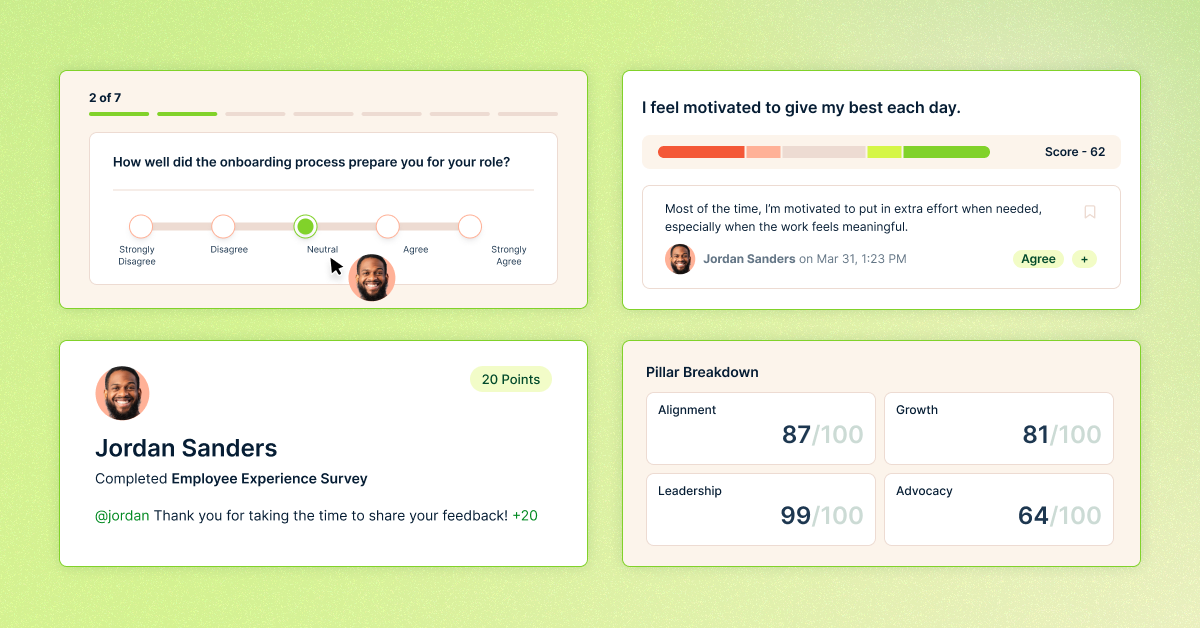How to Build Trust in the Workplace (10 Simple Steps)
.avif)

Do you know the number one thing that causes burnout in people? A lack of trust. In fact, 74% of people working in high-trust companies tend to be less stressed in general.
Be it personal or professional relationships, reliability is important in all forms of human contact.
When organizations don’t trust their employees, they impose restrictive policies. Similarly, if employees don’t trust their employers, they second guess their intentions and will resent work.
So, how about boosting your workplace productivity by building good relationships within your company?
Definition of Workplace Trust
Trust in general relates to reliability. It is the sense of being secure with people and having the space to express yourself and your ideas freely. The same feelings arising in a workplace results in workplace trust.
Here, we have explained a few things that come together to build workplace trust:
- The ability to be able to not be judged in a team. Even if a teammate expresses their vulnerabilities to the team, they do not feel that they will have to face negative consequences for the same.
- Trust builds the possibility of having healthy discussions in the organization. It allows people to have a difference of opinion without it affecting their professional relationships.
- Trust for the organization means that managers and employees feel comfortable giving their teammates goals. They find employees to be accountable in meeting all the reasonable goals and work for the betterment of the team.
- Trust in a workplace also means that coworkers support each other. They help each other reach their common goals through proper commitment. However, it doesn’t include tolerating unhealthy and unproductive behavior within the team.
Importance of Building Trust in the Workplace
Certain workplace relations need to be as strong as possible. As mentioned in a study by Gallup, a good relationship with one’s manager results in 70% more engagement and satisfaction. In fact, about 96% of CEOs in the world find trust building to be one of the most important exercises to develop a strong team.
Here are some reasons why building trust in your company is paramount:
- It encourages higher emotional intelligence and psychological safety within teams
- When people trust each other, they develop mutual respect important for professional relationships
- Higher trust value in the organization reduces employee turnover due to better job satisfaction
- It increases productivity because employees are highly satisfied in their jobs
- Organizations and managers can go easy on employees and give them more responsibilities, helping them with their professional growth.
- Team members feel comfortable asking questions and sharing their ideas.
- Office gossips reduce, inculcating a positive work environment and experience for everyone.
- Formal policies will get slightly lenient since the organization can rely on the team to be responsible and efficient enough to undertake challenges fearlessly.

What Builds Trust in a Workplace?
“Contrary to what most people believe, any level of trust is not some soft, illusive quality that you either have or you don’t; rather, trust is a pragmatic, tangible, actionable asset that you can create.” - Stephen M.R. Covey
When new employees come into a company, it is the formal policies and efforts that help build relationships and trust with other employees.
The 2016 Edelman Trust Barometer showed that out of 33,000 people from 28 countries, 1 in 3 employees mistrust their employers.
So, here are a few things you can do to help inculcate workplace trust in your company:
1. Feedback: Give it, Take it, Just be Honest
One of the best tools for building trust in an organization is feedback. The more honest feedback you give and take, the better your company relations will end up being. Why? Because when managers give constructive feedback, employees will always know that their faults will be pointed out to help them improve instead of being held against them.
Similarly, when the employer receives feedback from their organization, they should be able to act on it. Make sure that your company and employees are all open to feedback. Everyone should be open to feedback, be it good or bad. And everyone should want to work on that feedback so that the company can grow together.

2. Encourage Employee Interactions
All employees are humans after all. Therefore, everyone bonds and builds trust only through engagement and activity. As a manager or employer, you should always make sure that employee engagement is high. After all, only the best managers can increase employee retention through team building.
You should also encourage employees to be more interactive with one another. This way, trust-building is done on all levels of the organization, and not only between an employee and an employer.
Engagement activities can be anything such as weekly parties, intra-company communication, or even office potlucks. The only condition is that people in the company should get to talk to one another.
3. Set Privacy Policies
Setting certain privacy policies is very important in an organization. This is mostly to maintain personal and professional boundaries within the organization. Certain information such as salary disclosure and job roles might end up causing mistrust in an organization, making things complicated.
Privacy policies also help in encouraging employees maintain the distance that they might need between work and life.
4. Attention to Body Language and Non-Verbal Communication
Body language speaks more than words. When you are trying to build some faith with your team, you should have the empathy and ability to understand them, and the best way to do so is by reading their body language.
Some trust-building tricks include mirroring someone’s body language. Moreover, non-verbal communication can also help you know if someone is uncomfortable in the organization, giving you space to take accurate actions to help them feel more comfortable.

5. Build Accountability
Building accountability and making yourself look reliable to your employees in the organization is important. After all, how will anyone trust you if they do not think you are reliable? You need to make people see that they can rely on you with the goals you have set for yourself, right?
Accountability is also a great way of making people more productive since they will not want to break your trust.
6. Rely on Open-Door Policy
The open-door policy is a spectacular way to let your team know that you are available to talk at all times. This policy removes the initial hesitation involved in approaching a manager or coworker. When this hesitation barrier is removed, trusting people can become much easier.
The open-door policy also helps employees trust their managers more because they too can always know what their manager is up to. This might seem like a counter-effective policy in maintaining company hierarchy but is great for trust-building purposes. In fact, ensuring a flat hierarchy can go a long way in building trust.
7. Inclusivity is a Must
No organization can be truly trustworthy if it doesn’t aim to include all their employees in all of its initiatives. Inclusivity is a must in building healthy relations in the office. While diversity plays a huge role in building workplace culture, inclusivity is important in trust-building. Therefore, you need to focus on inclusivity as much as you do on diversity.
After all, what is the use of having so many people in your organization if they do not feel comfortable? You can only inculcate trust in an organization by ensuring that everyone feels welcomed and comfortable.

8. Model Yourself the Way You Want Others to be
Have you heard the saying that you should treat people the way you’d like to be treated? That is not only a great policy in building your personal relationships. Instead, when you can model yourself the way you want to be treated by others, you are more likely to be trustworthy. After all, you’d like people to seem friendly and trustworthy, right?
Also, when everyone treats people with respect and consideration, it is easier to build relationships.
9. Micromanagement Kills Trust
Micromanagement typically involves managers breathing down their teammates’ necks. It happens when managers are so sure that their team will not work properly that they keep looking into the smallest of their actions. This causes a lot of distress for employees because they do not get the freedom of expression and creativity in their work.
When running a high-trust organization, you should always make sure that your teammates never feel pressured because of supervision. Micromanagement is the opposite of trust and faith in employees and does not help anyone be productive in an organization.

10. Give Your Employees The Benefit of Doubt
In an organization, you cannot know what everyone is going through. Therefore, you should always give your coworkers, superiors, and juniors in a workspace the benefit of doubt. When you offer your employees the benefit of the doubt, you will let the concerned people know their mistakes without letting them know deliberately. That will help them grow professionally.
Practicing this also ensures that you do not hold resentment towards coworkers and employees. (And relieves the pressure of performance from the people working with you.)
How Do Effective Leaders Build Trust in a Workplace?
It is important to remember that trust cannot be built overnight. Trust, reliability, and accountability are things that do not come inherently but are built through actions.
Only leaders who try to develop professional and personal trust with their employees will ever be able to get the most out of their team. After all, no trust definitely leads to low productivity and a lack of drive in employees.
So, here we explain some ways in which effective managers generally build trust with their employees.
- Open-Door Policy: Open door policy basically means that managers will never shut their doors and allow open communication. This way, employees feel more comfortable sharing their opinion and ideas with the management.
- No Biases: It is imperative for leaders to not have any personal biases in the team. Seeing leaders hand unnecessary favors to select people in the team will lead to a blow down of trust.
- Checking In: The happening’s in personal lives might also affect people’s workplace productivity. Therefore, even though leaders do not have to be involved in their teammates’ lives, it is good to check in on them.
- Empathy: The ability to actually listen, empathize, and read body language makes a huge difference in building trust. When teammates feel understood, they will naturally feel more comfortable in their job.
- Openness: Only good leaders are open to criticism and opinions. Leaders should be able to set aside their personal biases and allow employees to be themselves in their functioning.

How To Build Trust Within Coworkers?
Yes, it is very important for managers to create trust in their employees. However, it is also crucial for them to be able to bond and feel comfortable with their coworkers. After all, these are the people they will be working with, and if they do not feel secure with them, how will they be satisfied?
In this section, therefore, let us talk about how everyone can build trust with their coworkers:
- Avoid Gossip: The number one factor affecting trust in a workspace is how much gossip goes on. If you are used to gossiping and talking about people behind their backs, now might be the time to stop. Gossiping is the exact way to lose place in people’s good books.
- Direct Communication: Most problems occur in a workspace when people do not converse openly. Several people in a workspace feel shy to talk about what actually goes on in their mind and hence, build resentment.
- Be Helpful: One very important factor that evokes trust in a workspace is mutual help and respect. When coworkers help each other with big and small projects, it helps develop a great sense of trust. It becomes easier to rely on someone in the team who helps others regardless of whether or not they are responsible to do so.
- Exuberate Positivity: Being positive in a workspace helps build trust in coworkers. After all, when you have a positive attitude, everyone thinks you’re reliable, right?
- Stick to Your Words: You should always keep your promises and meet your commitments. While you do not have to negatively push yourself to do so, try to always stand true to your words for people to be able to trust you.

Barriers to Building Trust in the Workplace
Naturally, some factors come in between leaders and employees and their efforts of building trust in an organization. While these factors might seem minuscule, their effects on workplace productivity are so deep that you cannot afford to overlook them.
In this section, let us look at the six different factors that dissuade trust from flourishing in an organization.
- No Shared Responsibility: When people do not share responsibilities, it is hard for them to seek things to bond on. When you act and think together, that is when you can build trustworthy relationships.
- Target Culture: Companies that work on strong target culture build unnecessary pressure on their employees. Under this pressure, employees could lose respect and trust in the organization. This doesn’t mean that employees should be left targetless, just that the targets need to be set properly so as not to pressurize them.
- Office Politics: The worst thing that can happen to workplace trust is office politics. Leaders at various departments and several coworkers clashing with one another for supremacy kills trust. Moreover, it also induces negativity in the office.
- Perception Change: It is human nature to change your mind about things, people, and situations. However, if someone feels judged and feels that people’s perception of them might change because of vulnerability, they will not feel secure.
- Improper Data: Another reason why clashes might occur in an organization is because of lack of proper data. When finances, policies, and models are not properly defined, managers might mistrust employees and vice-versa.
Frequently Asked Questions
Do you still have questions about building trust in the workplace? Here are the most frequently asked questions:
Q1: What can a lack of trust do to companies and their performance?
When there is no trust in a company, performance metrics, and employee retention fall drastically. No emotional trust leads to dissatisfaction. Resultantly, companies will impose several restrictive policies that will make employees burn out further.
Q2: Can you improve employee retention with a culture of trust?
Yes! Improved employee retention is one of the biggest reasons why it is important to gain employee trust. When employees feel secure with their employers, they are likely to be more satisfied with the work they are doing. Therefore, they are also likely to stay longer in the organization.
Another reason why employee retention increases with trust is because of low turnover rates. The higher an organization trusts its employees, the lesser will be their chances of leaving the organization.
Q3: What are the different types of trust that should exist in a company?
Well, there are three different levels in which trust should exist in a company:
- For employees on employers/managers
- Employers/managers to employees
- Between co-workers
The whole idea of trust in the workplace simply means that everyone gets to explore their ideas and personality without any fear of judgment. Whether it be personal, professional, or just general, when anybody feels comfortable confiding with people in the workspace, it simply means they trust their surroundings.
Q4: How does a trust-building policy affect employee experience and their professional relationship with the organization?
Trust-building policies allow teammates to be secure in sharing their ideas with their managers and co-workers. Similarly, things such as the open-door policy help managers have a personal conversation with an employee.
Humans, as social animals, crave closeness, bonds, and connections. Therefore, if an organization has good trust-building policies in place, employees are definitely likely to be much more comfortable and build a more fulfilling professional relationship with the organization.
Summing Up
So, by now you know how important it is to build a certain level of trust between the employees and the organization. It is important to build accountability, reliability, and recognition from both ends. Otherwise, the entire organization's culture can fall drastically, affecting professional experience and retention.














